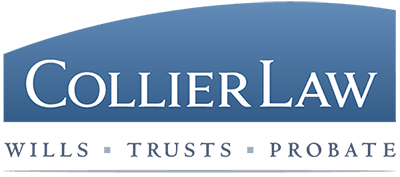Collier Law near Silverton is experienced in all aspects of trust law. Our practice focuses exclusively on wills, trust administration, probate, estate planning, guardianships, and conservatorships.
A basic estate plan is a set of documents that includes a Will, possibly a Revocable Living Trust, and supporting documents such as a Durable Power of Attorney, Advance Directive, and HIPAA Release. These legal tools help individuals, couples, and families plan for and deal with illness, incapacity, and death. These tools also play an important role in reducing income and estate taxes, providing for the smooth transition of a business, and supporting minor children.
Trust Attorney Consulting
How do I create a revocable living trust?
 If a revocable living trust is appropriate for you, you will need a written agreement that sets out your wishes and plans for the management and distribution of your assets. Once the trust agreement is in place, you must transfer your assets to the trust. Your assets will now be owned by the trust and managed by you as trustee of the trust. Real property deeds and other legal documents or paperwork may be necessary to ensure your bank accounts, investment accounts, and other assets are properly transferred to the trust. Assets not formally transferred to the trust might still be subject to probate. You must also have a pour-over will to ensure that any property not properly placed in your trust before death can be transferred to the trust after death.
If a revocable living trust is appropriate for you, you will need a written agreement that sets out your wishes and plans for the management and distribution of your assets. Once the trust agreement is in place, you must transfer your assets to the trust. Your assets will now be owned by the trust and managed by you as trustee of the trust. Real property deeds and other legal documents or paperwork may be necessary to ensure your bank accounts, investment accounts, and other assets are properly transferred to the trust. Assets not formally transferred to the trust might still be subject to probate. You must also have a pour-over will to ensure that any property not properly placed in your trust before death can be transferred to the trust after death.
If there are assets still owned in your name rather than your trust upon your death, then your pour-over will can transfer these assets to your trust. If the assets requiring probate include personal property valued under $75,000 and real property valued under $200,000, an Affidavit of Claiming Successor can be filed with the probate court, which allows for a shorter probate process. If your assets exceed one or both of those thresholds, a more comprehensive probate process is required.
Does a revocable living trust avoid taxes?
By itself, a revocable living trust does not avoid income, estate, or gift taxes. However, you can include provisions to effectively minimize or eliminate estate and gift taxes in a revocable living trust or will. Used properly, these tools can save you hundreds of thousands of dollars in taxes. Regardless of whether you have a trust-based or will-based estate plan, an Oregon State estate tax return must be filed after you die if your total property exceeds $1 million in value.
What does a revocable living trust cost?
The cost of a revocable living trust may depend on how complicated your assets and your estate planning goals are, how many assets must be transferred to the trust, and whether tax planning is necessary. Before you direct an attorney to set up a trust for you, ask for estimates of how much the entire process will cost, how much a will would cost in place of a Trust, and how much probate might cost given your assets and circumstances. Some law firms, including Collier Law, offer a complimentary initial consultation to learn about your estate planning goals before estimating the cost to prepare your documents.
A revocable living trust plan should include the trust document, assistance with funding your assets into the trust, a “pour-over” will to serve as a safety net for assets inadvertently omitted from the trust, and a durable power of attorney. It should also include related legal documents, such as an advance directive to address medical decisions and a certification of trust, which summarizes important trust terms and information.
Advanced Planning Strategies
Some individuals may want legal guidance with additional matters beyond the scope of the basic legal tools mentioned above. Below are some examples.
Tax Planning Tools Focused on Charitable Giving
 Charitable Remainder Trusts (CRATs and CRUTs)
Charitable Remainder Trusts (CRATs and CRUTs)
A charitable remainder trust is a trust that provides the trust makers or grantors income for some years, after which a charity (or charities) of your choice receives the remaining trust assets. The benefits to you include a reliable, steady stream of income for many years, a partial charitable income tax deduction, and possible capital gains tax relief.
Charitable Lead Trusts
A charitable lead trust is a trust you set up to provide income to a charity for a term. The longer the period, the better the gift tax savings will be to you as the creator of the trust. After the term ends, the remaining property in the trust is distributed to the beneficiaries you designated, such as yourself, family, or others.
Planning for your Retirement
Retirement Plan Trusts (also called IRA Trusts)
Your retirement plan is shielded from your creditors and bankruptcy, but the same protection is not provided to anyone who inherits the remainder of your retirement plan assets after your death. Also, those who inherit retirement plans are more likely to choose a lump-sum payout rather than a long-term payout, or rollover. This results in harmful negative income tax implications for your beneficiaries. Many people cringe at the thought of their hard-earned retirement account being spent in a year or two by their children. A retirement plan trust helps resolve these issues and provides important protection for your beneficiaries.
Life Insurance
Irrevocable Life Insurance Trusts (ILITs)
In general, your life insurance policy is included in your taxable estate at your death. If you wish to reduce estate taxes at your death, you may want to remove the insurance policy from your estate with an irrevocable life insurance trust. Additionally, you may be concerned that the beneficiaries of your insurance policy will not spend the proceeds appropriately upon your death. By designating a trust as the beneficiary of your policy and providing guidance to the trustee on how to invest or distribute those proceeds, you can simultaneously reduce taxes and have more control over the proceeds of your policy.
The legal team at Collier Law is here to assist you with trust proceedings, estate planning, and wills in Keizer, Silverton, and the surrounding areas. Please call our office to schedule your complimentary consultation with one of our experienced attorneys.
